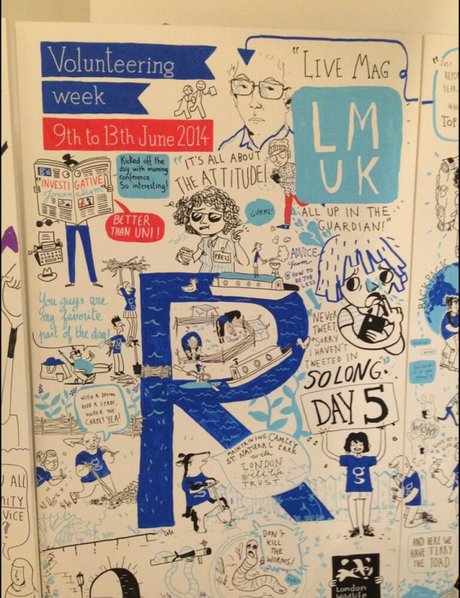This week, I took part in Volunteering Week at the Guardian. We had a visit from the bright young folks at Live Magazine and I subjected them to my thoughts on how to blog for an audience. Here’s what I told them.

Immortalised in art! The Guardian Volunteer Week mural
First of all, why should you listen to me? That’s a good question to ask yourself when anyone gives you advice, especially on your career. The endless listicles of do’s and don’ts regarding your CV, interview technique and especially blogging, often come from someone no more experienced than you. In this case, I’ve been running this blog for a year and a half and it got me a job. But check it out and see if you like it before you go casting me in the role of Advice Giver.
So, my two cents on blogging:
Writing your own blog is basically appointing yourself both columnist and editor. These are essentially opposite jobs – one is all ego, the other is zero ego. One thing to master when writing your own blog is not getting pulled too far in either direction. Your voice and the voices of others both need to come into it.
What do I mean? I’ll give you some examples of blogs we’ve all seen:
Blogs with too much ego:
“I’m Colin and here are my favorite films in order.” Nobody cares. Not even Colin’s mom.
“There has been a news event! Here’s what I think about it.” Why would we read this over the opinion of an experienced columnist, commentator or established know-it-all?
“Someone has said a thing! Here’s an insanely long, point-by-point dissection of why I agree/disagree with it.” Who are you and why am I taking 45 minutes out of my day to read your opinions? You are Man On The Bus to me.
Blogs with not enough ego
“Here’s a great quote I saw today, and the link to the article it came from.” This is fit for a tweet, not a blog post.
“Here is an embedded video from YouTube.” Umm…thanks, video fairy. Thanks for pointing this out. Who are you?
Copy-pasted full articles from various internet sites, linking to the original. Often without any theme. I have no idea why these even exist.
Here are some general blogging DO’s and DON’Ts:
DO:
- Pick an issue and blog about it until you’re the expert. Interview people, read the news on it, tweet, research, comment – eventually, people go to you first.
- Be consistent:
– in timing, ie blog regularly enough that no one would come to your landing page and think it’s a dead blog.
– in quality, ie make every post the best one you’ve ever done. Check your spelling, formatting, linking, etc. Quality trumps timing – never rush a post to meet an imaginary deadline.
– in tone, ie decide what your voice is (funny? Hard-hitting? Personal?) and stick to it. Keep the reader in mind and speak to them directly. - Engage with readers. Reply to comments, even if it’s just to say “Thank you”. Reply on Twitter and Facebook. Never get caught on transmit mode. A blog is not a publication in the traditional sense – you’re a person and you have a community of people. Chat to each other.
DON’T:
- Be vague about the topic of your blog. “Welcome to Stuffnthings, a blog of musings on life.” If it were Stephen Fry’s musings on life that would probably get a lot of hits – but you’re not Stephen Fry yet. Budding journalists are better off blogging one thing and doing it brilliantly.
- Make it all about you. Your reader doesn’t know you, so has no reason to find your opinions any more intriguing than the person next to them in the lift. Simple things like changing “I” to”we” can make all the difference. Take these two titles: “Dave’s jobhunt” vs “A million jobseekers: how are we supposed to stand out in today’s job market?” No offense to Dave, but why do I care about his jobhunt? I’m unemployed too. But a million jobseekers? “Ooh! That means ME!”
- Post “Sorry I haven’t posted in a while” if you’re lagging behind on your posting schedule. I promise you, no one has noticed, and all this does is draw attention to it – with a post that offers them nothing.
- Tweet “sorry I haven’t tweeted” either. It looks arrogant, as if you think Twitter has been lost without you – and it shows you’re panicking that you’re losing your audience. It’s the equivalent of standing in a crowded pub and yelling “I’M STILL HERE.” There’s no need. All you have to do is start tweeting again.
Questions? Extra tips? Post below! I will reply and tweet the best ones.

